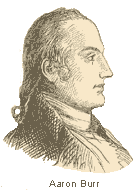Aaron Burr was born in Newark, New Jersey, the grandson of the noted minister Jonathan Edwards. In 1772, he graduated from the College of New Jersey (now Princeton University).
When war with Britain broke out, Burr joined the Continental Army and served with distinction in Benedict Arnold’s invasion of Canada, rising to the rank of lieutenant colonel. He retired from service in 1779 on account of ill health.
 Burr then studied law, was admitted to the bar and became a prominent New York attorney and politician. He served twice in the state legislature and later as the attorney general. Burr represented his state in the U.S. Senate from 1791 to 1797 and was thought to be a promising Republican candidate for the presidency.
In 1798, George Washington, who had returned from retirement to head the army, met with close advertisers, including Alexander Hamilton, to organize the army and decide which men would get commissions. Advised that men of republican sentiments (i.e. pro-France) might represent a danger, many decisions were made on political grounds rather than military capabilities. One of those excluded was Aaron Burr, who with some justification held Hamilton responsible.
In the Election of 1800 Burr received the same number of electoral votes as Thomas Jefferson. Burr did not attempt to influence the House in its efforts to decide the tied election, but was still blamed by Jefferson. From 1801 to 1805 Burr served as vice president, creating the awkward situation of a sitting president from one party and the vice president from the rival party. Jefferson largely ignored Burr, who contented himself with serving ably as President of the Senate.
In 1804, Alexander Hamilton conspired to deny the former vice president the governorship of New York. Burr challenged Hamilton to a duel in July 1804; Hamilton died from a wound sustained in that confrontation.
No proof exists, as is sometimes reported, that Burr was in league with members of the Essex Junto who schemed to remove New York and New England from the Union.
In 1806, Burr became involved in another plot the details of which are still not clear. Working with some unsavory characters, he planned to either seize lands in the Southwest from Spain or to remove lands from the United States. In any event he was betrayed, arrested and tried for treason in 1807. Presiding Judge John Marshall interpreted treason so narrowly that acquittal was assured.
Burr retired to Europe, where he sought financial assistance for his unending schemes. His life hit a low point with the loss at sea of an ever-faithful daughter. Burr later returned to New York, practiced law, and died in poverty and obscurity in 1836.
Burr then studied law, was admitted to the bar and became a prominent New York attorney and politician. He served twice in the state legislature and later as the attorney general. Burr represented his state in the U.S. Senate from 1791 to 1797 and was thought to be a promising Republican candidate for the presidency.
In 1798, George Washington, who had returned from retirement to head the army, met with close advertisers, including Alexander Hamilton, to organize the army and decide which men would get commissions. Advised that men of republican sentiments (i.e. pro-France) might represent a danger, many decisions were made on political grounds rather than military capabilities. One of those excluded was Aaron Burr, who with some justification held Hamilton responsible.
In the Election of 1800 Burr received the same number of electoral votes as Thomas Jefferson. Burr did not attempt to influence the House in its efforts to decide the tied election, but was still blamed by Jefferson. From 1801 to 1805 Burr served as vice president, creating the awkward situation of a sitting president from one party and the vice president from the rival party. Jefferson largely ignored Burr, who contented himself with serving ably as President of the Senate.
In 1804, Alexander Hamilton conspired to deny the former vice president the governorship of New York. Burr challenged Hamilton to a duel in July 1804; Hamilton died from a wound sustained in that confrontation.
No proof exists, as is sometimes reported, that Burr was in league with members of the Essex Junto who schemed to remove New York and New England from the Union.
In 1806, Burr became involved in another plot the details of which are still not clear. Working with some unsavory characters, he planned to either seize lands in the Southwest from Spain or to remove lands from the United States. In any event he was betrayed, arrested and tried for treason in 1807. Presiding Judge John Marshall interpreted treason so narrowly that acquittal was assured.
Burr retired to Europe, where he sought financial assistance for his unending schemes. His life hit a low point with the loss at sea of an ever-faithful daughter. Burr later returned to New York, practiced law, and died in poverty and obscurity in 1836.